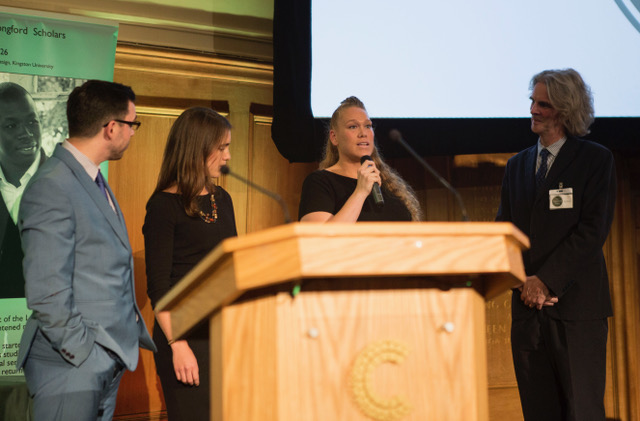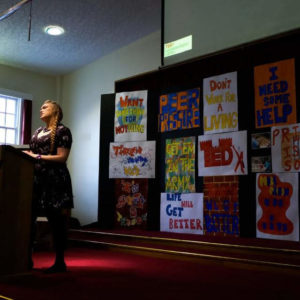
We need more lived experience leaders in the justice system…like you!
CJ Burge has recently been appointed a new Trustee of the Longford Trust, alongside another former scholar. Here the First class degree graduate reflects on her journey from prison to boardroom, offering hope and advice to other upcoming leaders who have personal experience of prison.
I was bowled over when I got the call from the Longford Trust’s Chair to say that they would be delighted to have me as a Trustee on their Board. I was thinking “I’m the one who’s delighted, humbled, elated….!”
You see, even now, years on from my release from prison, I still suffer from impostor syndrome. Impostor syndrome is the feeling that I shouldn’t be where I am, doing the things I’m doing: sitting amongst these professionals; leading this partnership meeting; speaking on a podium to a national conference of experts; being asked for my perspective by senior government officials, and the list goes on….Impostor syndrome in this context is institutionalisation’s best friend, waiting to confront you as you leave the prison gates, hiding in your shadow as you stride forward into your new life. Although it has never quite gone away, I’ve learnt to live with it, and I’ve found that over the years, the more I’ve challenged myself to do new things, and be in new settings (that quite frankly have filled me with trepidation), the more I’ve conquered and silenced my unwelcome friend from prison.
If you’d have asked me 7 years ago, when I started my degree in prison, whether I’d be where I am today – Trustee of two remarkable charities, and a National Service Manager at another – I’d have smiled at you in incredulity and utter disbelief.
Incarceration and the prison system are far from the vessels of hope and transformation they really should be in a progressive 21st century society like ours.
Reflecting on what has got me here and how it has been possible, I’ve boiled it down to a combination of actions, mindsets and opportunities that have accelerated my path to being in leadership positions, just four years out of prison.
Actions
The one thing I knew for sure in prison was that I needed to re-educate myself. If I was going to go anywhere or do anything of significance, I needed to use the thousands of hours at my disposal to better myself as a human being, so that one day I could effectively give back to the community I would be re-entering. I was fortunate enough to get a scholarship through the Longford Trust to study Law, and with that came an amazing mentor who encouraged, inspired and challenged me, in equal measures. At the end of my degree, the opportunity to do a placement at the Cabinet Office arose, again through the Trust, and this short immersion in all things government and policy lifted the lid on what I thought was possible. It enabled me to dream the dream, that people like us could one day be in positions like those, not just as some summer intern, or token achiever, but for the knowledge, skills and much-needed lived experiences that we bring of the criminal justice services and social systems that see people at their lowest, most vulnerable state, and in much need of help.
Mindsets
 The number one mantra for me has been to embrace challenge positively. I’ve known all along my journey, from 9 months’ solitary confinement in a Japanese prison, to having my daughter taken away from me at birth, to speaking in front of hundreds at a Longford Lecture or even delivering the first TEDx talk in a prison in the UK, that this would be hard, well more than hard, potentially soul-destroying if I allowed it to be. Very early on I had to come to terms with my actions that had led me to where I was and the hurt that I had caused others. I made a decision that this wasn’t the end, that no matter what, I could turn it around and, though now through a more colourful path, still fulfil my life’s ambitions to help others. Notice I said embrace challenge positively? Well positivity and gratitude are the two other mindsets that have smoothed the rocky landscapes that I have traversed. Without these I would have probably been bailing out of every challenge that came my way, but it was the positive thinking and the gratitude that kept me both buoyant and grounded, at the same time.
The number one mantra for me has been to embrace challenge positively. I’ve known all along my journey, from 9 months’ solitary confinement in a Japanese prison, to having my daughter taken away from me at birth, to speaking in front of hundreds at a Longford Lecture or even delivering the first TEDx talk in a prison in the UK, that this would be hard, well more than hard, potentially soul-destroying if I allowed it to be. Very early on I had to come to terms with my actions that had led me to where I was and the hurt that I had caused others. I made a decision that this wasn’t the end, that no matter what, I could turn it around and, though now through a more colourful path, still fulfil my life’s ambitions to help others. Notice I said embrace challenge positively? Well positivity and gratitude are the two other mindsets that have smoothed the rocky landscapes that I have traversed. Without these I would have probably been bailing out of every challenge that came my way, but it was the positive thinking and the gratitude that kept me both buoyant and grounded, at the same time.
Opportunities
The very definition of opportunity, a set of circumstances that makes it possible to do something, may have you believe that you need to wait for those sets of circumstances to arise before you can even get a whiff of an opportunity. I see it a bit differently though, that we can engender the right circumstances by preparing and getting ourselves in a position to have opportunities line up at our door.
In my case it started with volunteering I undertook a qualification in prison delivered by St Giles in Information, Advice & Guidance, and became one of their Peer Advisors, supporting women in prison with resettlement issues. A bit later I volunteered whilst on day release (or ‘RoTL’ as it’s known) in the community in the St Giles’ Peer Advisor Contact Centre. I also secured a volunteer placement at the Southwark Law Centre.
Volunteering gave me the skills and knowledge to apply more confidently for jobs, and fortunately I secured a paid role coordinating for the award-winning educational and preventative SOS+ Service at St Giles. I can’t tell you how overwhelmed I was when I landed the job, it reduced me to tears knowing that someone out there valued me enough to pay for my contributions. Volunteering gave me a steady foundation, a base to jump off from, but that first job, being paid for the hard work I was putting in, that cemented and deep-rooted a new sense of self-worth, identity and value.
I am passionate about rehabilitation and second chances, which is why everything that the Longford Trust does resonates with me. For the last five years I have given my absolute all to developing a service that champions the potential of people with lived experiences of the criminal justice system, by providing opportunities to learn and develop skills that lead to sustainable career prospects. I am a staunch advocate for meaningful opportunities for people who leave prison, having seen first-hand the multitude of barriers for those with convictions, and the incredibly difficult circumstances many who find themselves in prison have faced. As a Trustee of the Criminal Justice Alliance (‘CJA’), I chair their Lived Experience Expert Group that meets quarterly to bring together CJA members to provide advice, support and expertise to our work on lived experience and improving the diversity of the criminal justice workforce to include, at all levels, those with lived experiences.
We need more employers and organisations in the justice sector to recognise, value, include and recruit into leadership and influencing roles people with lived experiences of the criminal justice system,
if we are “to (re)build a system that learns from those with crucial insights into the challenges that undermine the system’s key objectives” (Change from Within, CJA report 2019). Moreover, the benefits of having lived experience on non-profit boards are numerous: from “improving the quality of evidence based decision making”, to providing “credibility, legitimacy, efficiency, effectiveness,… authentic representation and a better understanding” to the issues in need of tackling, as academics from Cass Business School have found.
I am really glad to see incremental positive changes taking place across our sector with trailblazing charities, like the Longford Trust, leading the way by walking the talk and valuing lived experience. I end this blog echoing the Change from Within report’s call to action to the whole criminal justice sector, including public and private sector agencies, to recognise, celebrate and invest in people with lived experience. Whilst also encouraging all my peers to continue to welcome challenge positively, to believe in the value of and to harness their lived experiences, and always, always to aim high!